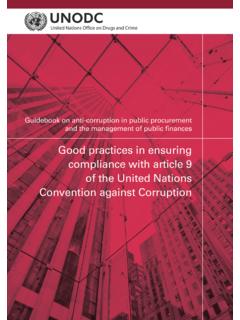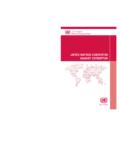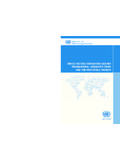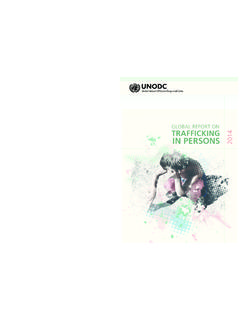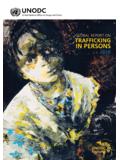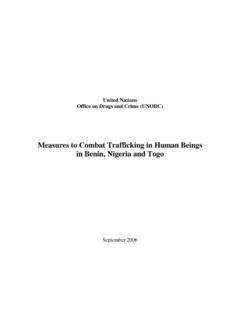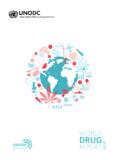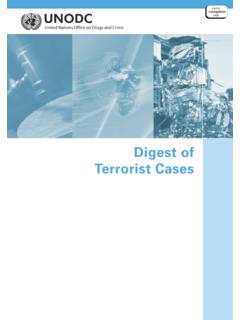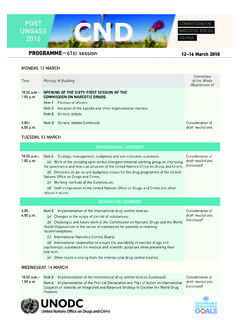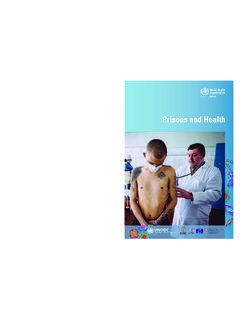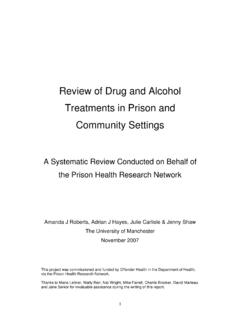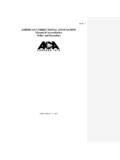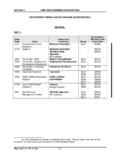Transcription of The United Nations Standard for the Treatment of Prisoners
1 The United Nations Standard Minimum Rules for the Treatment of Prisoners (the Nelson Mandela Rules)An updated blueprint for prison management in the 21st century It is said that no one truly knows a nation until one has been inside its jails. A nation should not be judged by how it treats its highest citizens, but its lowest ones. Nelson Rolihlahla MandelaHow and why was the review process of the SMRs initiated?The Standard Minimum Rules for the Treatment of Prisoners (SMRs)1 constitute the universally acknowledged minimum standards for the management of prison facilities and the Treatment of Prisoners , and have been of tremendous value and influence in the development of prison laws, policies and practices in Member States all over the world. In recognition of the advances in international law and correctional science since 1955, however, the General Assembly decided, in 2011, to establish an open-ended intergovernmental Expert Group to review and possibly revise the SMRs.
2 Civil society and relevant United Nations bodies were equally invited to contribute to the As adopted by the First United Nations Congress on the Prevention of Crime and the Treatment of Offenders in 1955 and approved by the Economic and Social Council by its resolutions 663 C (XXIV) of 31 July 1957 and 2076 (LXII) of 13 May did the review process of the SMRs proceed?In the course of three meetings (2012-14) closely accompanied by the United Nations Office on Drugs and Crime (UNODC), the intergovernmental Expert Group made progress in identifying thematic areas and specific rules for revision, while closely adhering to the overall parameters of the revision process determined by the General Assembly: (a) Any changes to the rules should not lower any of the existing standards but should improve them so as to promote safety, security and human conditions for Prisoners ; and (b) The revision process should maintain the existing scope of application of the its fourth meeting held in Cape Town, South Africa, in March 2015, the Expert Group reached consensus on all of the rules opened for revision.
3 In May 2015, the Commission on Crime Prevention and Criminal Justice (CCPCJ) endorsed the revised rules and submitted the entire set of the revised SMRs for approval by the Economic and Social Council (ECOSOC) and subsequent adoption by the General Assembly as the United Nations Standard Minimum Rules for the Treatment of Prisoners .Why are the rules to be known as the Nelson Mandela Rules?The fourth meeting of the Expert Group recommended that the revised SMRs also be known as the Nelson Mandela Rules in order to honour the legacy of the late President of South Africa, Nelson Rolihlahla Mandela, who spent 27 years in prison in the course of his struggle for global human rights, equality, democracy and the promotion of a culture of peace. Nelson Mandela International Day (18 July) was further recommended to be also utilized to promote humane conditions of imprisonment, raise awareness about Prisoners being a continuous part of society and value the work of prison staff as a social service of particular areas of the Standard Minimum Rules have been revised?
4 Prisoners inherent dignity as human beingsVulnerable groups of prisonersMedical and health servicesInvestigation of deaths and torture in custodyRestrictions, discipline and sanctionsAccess to legal representationComplaints and inspectionsTerminologyStaff ! !After a careful analysis of the advances in international law, correctional science and best practices since 1955, the Expert Group opted for targeted revisions of the Standard Minimum Rules in these nine thematic areas. Altogether, around 35 per cent of the rules have been revised and/or I, which is applicable to all categories of Prisoners , now includes an extended set of five Basic Principles , which outline the overall spirit under which the rules should be read. Some of these principles have been relocated, in amended form, from Part , which is reserved for sentenced Prisoners .
5 Other fundamental principles have been added in reflection of advances in international law. These include, in particular, an obligation to: Treat all Prisoners with the respect due to their inherent dignity and value as human beings. Prohibit and protect Prisoners from torture and other forms of ill- Treatment . Ensure the safety and security of Prisoners , staff, service providers and visitors at all prisoner S INHERENT DIGNITY AND VALUE AS HUMAN BEINGS refer to Rules 1 to 5 of the United Nations SMRs6 The impartial application and the prohibition of discrimination based on race, colour, sex, language, religion, political or other opinion, national or social origin, property and birth included in the old version of the SMRs have been expanded to include any other status. Importantly, putting into practice the principle of non-discrimination has been interpreted to include an active obligation to: 2.
6 VULNERABLE GROUPS OF Prisoners refer to Rules 2, 5(2), 39(3), 55(2) and 109-110 of the United Nations SMRs Take account of the individual needs of Prisoners , in particular the most vulnerable categories. Protect and promote the rights of Prisoners with special needs. Ensure that Prisoners with physical, mental or other disabilities have full and effective access to prison life on an equitable basis, and are treated in line with their health conditions. 73. MEDICAL AND HEALTH SERVICES refer to Rules 24-27, 29-35 of the United Nations SMRsThe revised rules emphasize that the provision of health care for Prisoners is a State responsibility, and add significant detail to the overall principles, scope and composition of health-care services in prisons. Duties and prohibitions of health-care professionals are enhanced in line with the principle that their relationship with Prisoners is governed by the same ethical and professional standards as those applicable to patients in the community.
7 More specifically, these include: Ensuring the same standards of health care that are available in the community and providing access to necessary health-care services to Prisoners free of charge without discrimination. Evaluating, promoting, protecting and improving the physical and mental health of Prisoners , including Prisoners with special health-care needs. Adhering to the principles of clinical independence, medical confidentiality, informed consent in the doctor-patient relationship and continuity of Treatment and care (including for HIV, tuberculosis, other infectious diseases and drug dependence). An absolute prohibition of health-care professionals to engage in torture or other forms of ill- Treatment , and an obligation to document and report cases of which they may become !4. RESTRICTIONS, DISCIPLINE AND SANCTIONS refer to Rules 36-39, 42-53 of the United Nations SMRsExplicit reference is made to the principle that no use of restriction or disciplinary punishment may amount to torture or other forms of ill- Treatment , and that all general living conditions continue to apply to Prisoners subjected to disciplinary sanctions.
8 New provisions further define and restrict the use of solitary confinement as well as the use of instruments of restraint, regulate searches of Prisoners and cells, and clarify the role of health-care professionals in the context of disciplinary proceedings. In particular, the revised rules: Define (prolonged) solitary confinement as the confinement of Prisoners for 22 hours or more a day without meaningful human contact (for more than 15 consecutive days), and restrict the use of solitary confinement as a measure of last resort to be used only in exceptional circumstances. Prohibit indefinite or prolonged solitary confinement, the placement of a prisoner in a dark or constantly lit cell, the reduction of a prisoner s diet or drinking water as well as the use of instruments of restraint which are inherently degrading or painful, such as chains or irons.
9 Provide detailed guidance on searches of Prisoners and cells as well as on the legitimate use of instruments of restraint in line with the need to ensure security and safety in prison as well as the respect to the inherent human dignity of Prisoners . Confirm that health-care professionals should pay particular attention to involuntarily separated Prisoners , but exclude their involvement in the actual imposition of disciplinary sanctions. Encourage prison administrations to use, to the extent possible, conflict prevention, mediation or other alternative dispute resolution mechanisms to prevent or resolve conflicts. 95. INVESTIGATION OF DEATHS AND TORTURE IN CUSTODY refer to Rules 6-10, 68-72 of the United Nations SMRsIndependent investigations are now foreseen in all cases of custodial death as well as in other situations of serious concern.
10 For transparency and accountability purposes, the information to be registered for all Prisoners has been expanded, as have the notifications which the prison administration must give to Prisoners or outside parties in far-reaching situations. More specifically, the revised rules: Specify information to be entered in the file management system upon admission of every prisoner and in the course of imprisonment, and clarify that these shall be kept confidential. Detail the right of Prisoners or outside parties (family or designated contact persons) to be notified about imprisonment, transfer to another institution, serious illness, injury or death. Require any custodial death, disappearance or serious injury of a prisoner to be reported to a competent authority independent of the prison administration mandated to conduct prompt, impartial and effective investigations into the circumstances and causes of such cases.
